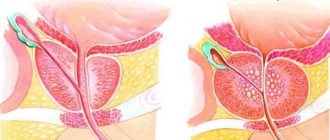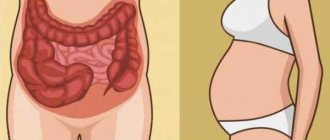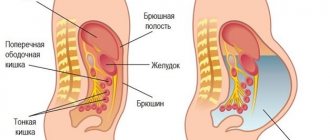Light flatulence in the morning is a completely natural process, typical for everyone. It occurs as a result of the work of normal microflora, which helps digest food and supports the immune system. Gases in the intestines are formed at any stage of human life, but their average volume should not exceed 500 ml. The normal process of gas formation does not cause bloating or pain in the abdominal area. If unpleasant symptoms are present, then, as a rule, this is a sign of increased flatulence.
Is bloating in the morning normal?
Flatulence is bloating of the intestines, initiated by the accumulation of gas bubbles in its loops. Flatulence can be caused by both physiological and pathological reasons. Almost everyone gets irritated in the morning, and a similar process begins immediately after waking up. During night sleep, a person lies horizontally; in this position, the removal of gases is weakened. But as soon as he wakes up, all the processes occurring in the body are activated.
With the resumption of flatulence (the release of digestive gases), the abdomen may become bloated and flatulence may occur. But these are normal processes that do not require treatment. You should only worry if such a process is associated with discomfort and the following symptoms are noted:
- spasms;
- belching;
- fermentation;
- rumbling in the stomach;
- constipation or diarrhea.
How are they formed?
- Air bubbles result from the breakdown of various foods and drinks during the digestion process. In this way, methane, hydrogen, sulfur and nitrogen compounds (which mainly have an unpleasant odor) are released - up to 75%.
- Carbon monoxide is produced by the interaction of hydrochloric acid in the stomach and pancreatic juice with enzymes produced by the pancreas.
- Air can simply enter the body when swallowing food, brushing teeth, active communication or laughter, etc. Bubbles enter the blood and invariably accumulate in the intestines.
Removal of foreign gas mixtures occurs through the rectum, vomiting, belching, and also through exhaled air. The method of elimination directly depends on the work of the muscles of the diaphragm and the walls of the peritoneum, the health of the gastrointestinal tract, and intestinal motility. It has been noted that with dense, segmented feces (appears as a result of chronic constipation, taking certain medications, or diet), the removal of gas bubbles through the rectum is impaired.
How do you know if you are suffering from gas? The volume of their release from the body varies from person to person, but in general the number of flatulence passages per day is about 12-20 times. This range should be considered a physiological norm, and not a disease called “flatulence.”
Causes of morning flatulence in adults
The occurrence of morning flatulence is often associated with dietary errors. Dinner is always eaten 3-4 hours before bedtime. Night snacks or meals before bed invariably lead to fermentation in the stomach. In such cases, digestion is difficult, causing food to stagnate and rot. This is why belching, bloating and heaviness in the abdomen can be annoying in the morning.
But there are other causes of flatulence. For example, abuse of gas-forming products. These include:
- cabbage;
- legumes;
- smoked meats;
- bakery products.
Drinking soda, kvass or beer also affects the body. But if you abstain from them in the evenings, you can easily avoid digestive problems and such unpleasant symptoms as cramps or flatulence in the morning.
Flatulence products
There are food additives that have a carminative effect and neutralize the effect of gas-forming products. So, when preparing dishes from legumes, it is useful to supplement them with chervil, thyme, caraway, savory and tarragon. Chervil and tarragon are common folk remedies for flatulence.
It won’t hurt to acquire other healthy habits, for example, introducing oat bran into your diet.
Foods such as potatoes, pasta, rice, eggplant and dietary animal protein will take excellent care of the digestive tract. It is found in abundance in poultry and fish. Berries and unrefined vegetable oils will be no less useful. You also need to make sure you drink enough water.
What diseases cause flatulence
Morning gas in the stomach can also cause ailments of the digestive system, so if you have suspicious symptoms, it is worth examining the gastrointestinal tract. As a rule, flatulence is provoked by:
- hepatitis or cirrhosis of the liver;
- intestinal dysbiosis;
- neurological diseases;
- intestinal infections;
- colitis, enteritis;
- parasites.
Causes
People hear and feel rumbling in the stomach when the small intestine intensively “drives” the forming bolus of food further into the large intestine, and also cleanses its lumen between meals. This mechanism is associated with the work of the muscle wall and intestinal villi. It intensifies when a large amount of air enters from the stomach.
Non-pathological causes
If rumbling rarely bothers a person and is not accompanied by other symptoms from the digestive system, then this process is physiological in nature.
Causes of physiological seething in the stomach:
- The period of “cleaning” in the small intestine. It is also called the migratory motor complex. The idea is that in the intervals between meals, the stomach throws everything out of itself into the small intestine. It also begins to actively cleanse its cavity thanks to the consistent contraction of all muscle fibers.
- Nutritional features. Consumption of certain foods that increase gastrointestinal motility (fermented milk and confectionery products, baked goods, fresh vegetables, fruits, alcohol) also leads to rumbling in the stomach.
Thus, periodic seething in the stomach does not mean hunger at all, but the coordinated work of the stomach and small intestines in order to carry out “cleaning”. Moreover, the intensity of the rumbling depends on the amount of air that enters the digestive tube along with food.
After a thorough cleansing, a period of calm begins, so nutritionists and nutritionists recommend taking breaks between meals of 4-5 hours. If at the moment of “cleaning” a person decides to eat again, then she stops.
Pathological causes
In addition to natural processes in the gastrointestinal tract, frequent rumbling can be a sign of inflammatory or infectious intestinal damage.
- Acute intestinal infections. If pathogenic microbes enter the intestines, an acute infectious process develops, resulting in the release of excess gases. Increased mucus production and toxins released by bacteria also activate gastrointestinal motility. In addition to rumbling, the patient will experience nausea, fever, diarrhea and abdominal pain.
- Irritable bowel syndrome. This is a functional pathology that often worsens during stressful situations. In this case, the seething is explained by the peculiarities of the innervation of the intestinal wall (especially its muscular membrane). The disease is characterized by complaints of abdominal pain, flatulence, frequent bowel movements, and weight loss.
- Chronic colitis. Prolonged inflammation of the intestinal wall leads to dystrophy, disorganization of motility, and impairs the absorption of vitamins, fluids and nutrients. Symptoms of the disease: rumbling and painful sensations in the abdomen, bloating, upset stool, discharge of mucus in feces, weight loss, skin rashes.
Be sure to read: Diseases of the duodenum: symptoms, diagnosis and treatment
In some cases, pathological rumbling in the abdomen appears during exacerbation of chronic cholecystitis, gastroduodenitis or pancreatitis. However, this symptom is not specific.
Causes of flatulence in children
Separately, it should be said about the causes of morning flatulence in children. Early age has its own characteristics associated with the functioning of the digestive organs.
Underdevelopment of the gastrointestinal tract or lack of enzymes
Because of this developmental disorder, the food received is not completely digested. Its remains ferment, causing the formation of gas.
Problems with bacterial flora
They are caused by the use of antibacterial agents. Due to its rapid development, a child’s body is not always able to instantly recover from prescribed medications. And if there is no beneficial microflora, then normal digestion of incoming food is impossible. It lends itself to rotting and fermentation, thereby causing flatulence.
Enzyme deficiency
In infants, flatulence may indicate a lack of the enzyme lactase. Without it, milk cannot be digested.
Swallowing air
Morning flatulence may be the result of your baby catching air. This often happens when the baby cries or is in the wrong feeding position.
Infections
Flatulence provokes infection with E. coli. But other harmful microorganisms also have a negative impact on the functioning of the organ.
In other cases, if a child’s stomach is swollen in the morning, the reasons are the same as in adults. These are incorrectly selected products and violations of food intake.
Causes of flatulence in pregnant women
The main cause of the problem in expectant mothers is enzyme deficiency. Bloating may be accompanied by heartburn, belching and heaviness in the abdominal area. When a woman ignores doctor's orders, overeats or violates nutritional rules, flatulence becomes chronic. Moreover, pancreatitis may develop in the future.
Excessive flatulence in women in an interesting position may occur due to increased levels of progesterone.
This hormone ensures relaxation of the muscles of internal organs, and the intestines are no exception. When its tone weakens, the digestion process slows down, which is why food stagnation and flatulence are possible.
Bloating can occur due to the growth of a tumor in the reproductive organs or during an ectopic pregnancy. Therefore, if you experience such symptoms, it is important to immediately arrange a visit to the doctor.
How to deal with the problem
There is no need to eliminate mild bloating - just go to the toilet after sleep. As a rule, having a bowel movement relieves the problem. But when this does not give the desired effect, you can drink a carminative or sorbent. If flatulence is caused by constipation or intestinal dysbiosis, then laxatives and probiotics will help. They are prescribed by a doctor.
Medications
The main emphasis in correcting the condition is on medications. Often they resort to such means as sorbents, “defoamers” and antispasmodics.
Sorbents are a group of drugs that absorb toxins and eliminate excessive gas formation. As a rule, they accept:
- activated black carbon;
- Enterosgel;
- Polysorb;
- Smecta.
If we talk about medications that eliminate flatulence (“defoamers”), their task is to facilitate the absorption of gases into the blood and their evacuation through the rectum. Among them, Infacol, Mezim Forte, Simikol, Simethicone and Espumisan are especially popular. Antispasmodics become indispensable for abdominal cramps. Often prescribed:
- Buscopan;
- Drotaverine;
- Mebeverine;
- Papaverine.
Folk remedies for flatulence
To eliminate flatulence, many people use herbal remedies. At home, they resort to folk recipes.
Infusion of dill seeds and fennel seeds
To prepare it, pour a teaspoon of seeds into a glass of boiling water and leave for 20 minutes. When the infusion is filtered, the product is ready. You need to take liquid before each meal for 10 days. Then they take a week break and repeat the course.
Parsley infusion
Take fresh parsley leaves (a small bunch), chop them and pour 1 liter of boiling water. Leave the infusion for 8 hours, then filter and take 100 ml after meals.
Mint tea with ginger
In this tea, mint provides a soothing effect, and ginger is antimicrobial and anti-inflammatory. To prepare the drink, take 1 teaspoon of chopped mint and ginger root, pour a glass of hot water and leave, covered with a lid. The drink is then filtered and taken before meals.
Diet therapy
Flatulence requires a special nutritional system - fractional meals. Food is taken up to 6 times a day in small portions, by the hour. This approach to nutrition helps improve digestion and improves enzyme synthesis. An interval of 3 hours should be maintained between meals. Avoid snacks with “fast carbohydrates” (baked goods, confectionery), as they contribute to fermentation and flatulence.
All dishes should be served warm.
You should also chew each piece thoroughly. Among the processing methods, it is recommended to give preference to boiling, stewing and steaming. Such food is much lighter than fried food, is digested more quickly and does not leave a heaviness in the stomach. To avoid constipation, it is important to monitor the amount of fluid you drink. You need to drink at least 1.5-2 liters per day.
What foods are good for flatulence?
It is extremely useful to include in your diet foods that normalize gastrointestinal motility. These include:
- low-fat fermented milk drinks;
- baked and boiled vegetables;
- vegetable and fruit salads;
- dietary types of meat;
- crumbly porridge;
- lean fish.
Causes of bloating
Flatulence, as this condition is otherwise called, can occur for a number of reasons, many of which are quite serious. Bloating and gas formation occur due to the presence of:
- chronic pancreatitis - acute lack of nutritional enzymes produced by the pancreas. Since there is nothing to digest the food, it accumulates in the stomach, creating a feeling of heaviness and bloating after eating;
- Irritable bowel syndrome – a person experiences bloating and abdominal pain due to changes in bowel movements;
- dysbiosis - a disease characterized by problems in the microflora, due to which pathogenic microorganisms located on the walls of the mucous membrane begin to produce gases that interfere with the full functioning of the gastrointestinal tract;
- individual lactose intolerance - the diagnosis is also associated with enzyme deficiency: the patient does not have enough milk sugar, which contributes to the complete absorption of lactose. In the presence of this syndrome, intestinal flatulence can occur at any age, but it is most often diagnosed before the age of 5-8 months;
- Intestinal obstruction is a fairly serious disease that can be diagnosed early. In this case, flatulence is associated with the growth of polyps or the formation of a tumor in the intestinal area. In most cases, surgery is required;
- Celiac disease is an extremely rare disease, but it does occur. According to statistics, in our country only 1 person out of 1000 is affected by it. Celiac disease is associated with a partial or absolute inability to break down gluten, as a result of which toxic compounds are created in the body that negatively affect the surface of the intestines. If a patient is diagnosed with this, then, first of all, he is prescribed a diet for flatulence, based on the complete exclusion of gluten from the diet. This includes sausages and sausages, barley. Wheat, rye, oatmeal, pasta made from regular flour, baked goods, ready-made sweets, store-bought yoghurts and curds, etc. A gastroenterologist may also prescribe enzymatic medications designed to break down gluten that enters the body.
Often, one of the reasons that provokes bloating is poor nutrition and abuse of foods that do not bring any benefit to the body.
- Frequent consumption of various carbonated drinks such as Coca-Cola and sparkling mineral water. Bloating in the lower abdomen that occurs for this reason, as a rule, goes away on its own and quite quickly: gases are absorbed into the body through the intestinal walls and then removed from it without additional help.
- Too large portions of food. Nutritionists around the world categorically do not recommend eating huge portions. Hastily eating food, quickly swallowing it instead of chewing it normally, is harmful to the digestion process. Abdominal bloating and gas formation that arise for this reason require a simple treatment - just change your approach to nutrition.
- An abundance of foods in the diet that cause fermentation, which, in turn, stimulates bloating and gas formation in an adult or child. The solution to this problem is not difficult: it is necessary to limit the consumption of sweets, baked goods, legumes, potatoes and other foods known for their content of starch and fast carbohydrates.
- Eating foods that are incompatible with each other. For example, any fruits should be separated from the main meal: eat them about 1 hour before or 2 hours after breakfast, lunch or dinner.
Prevention
Flatulence is always easier to prevent than to deal with it later. To avoid this unpleasant phenomenon, you just need to follow certain rules:
- do not eat gas-forming foods in the evening, especially dairy;
- Flatulence can be provoked by physical activity, so training is advised to be carried out in the morning and afternoon;
- avoid sudden changes in the menu - “harmful” foods should be replaced with healthy dishes gradually.
If flatulence is often accompanied by constipation and vomiting, then it is logical to assume problems with the gallbladder. In this case, you need to minimize the amount of fatty foods.
When flatulence occurs for a long time, you should not self-medicate. It is optimal to contact a gastroenterologist and together look for the causes of the pathological condition. But it is possible that flatulence is provoked not only by abnormalities in the gastrointestinal tract, but also by disturbances in other systems of the body.










